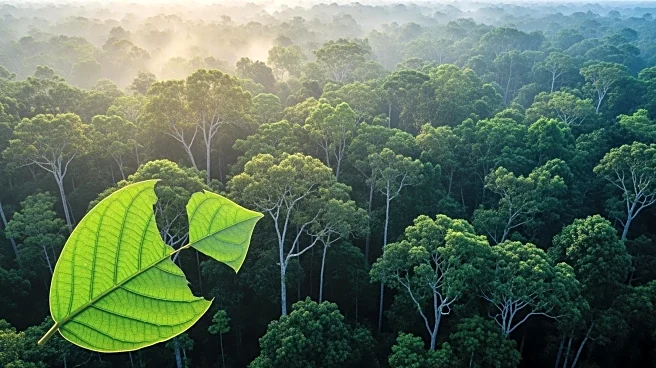What's Happening?
Brazil is hosting the United Nations climate talks, COP30, in the Amazon rainforest, aiming to establish itself as a global environmental leader. President Luiz Inácio Lula da Silva has made significant efforts to reduce Amazon deforestation, achieving
the lowest levels in 11 years. However, Brazil's environmental policies are under scrutiny due to its approval of offshore oil drilling and plans to build a highway through the Amazon. These actions have raised doubts about Brazil's commitment to climate leadership, especially as it remains one of the world's largest greenhouse gas emitters and oil producers. The summit is taking place amid a backdrop of shifting global climate dynamics, with developing countries like Brazil playing a crucial role in shaping future emissions trajectories.
Why It's Important?
Brazil's actions have significant implications for global climate efforts, as it is a major emitter of greenhouse gases and a key player in the international oil market. The country's environmental policies are critical in the context of global climate change, as deforestation in the Amazon contributes significantly to emissions. Brazil's approach to balancing economic development with environmental protection is a microcosm of challenges faced by many developing nations. The outcome of COP30 and Brazil's policies could influence international climate negotiations and commitments, impacting global efforts to transition away from fossil fuels and protect vital ecosystems like the Amazon rainforest.
What's Next?
Brazil faces pressure to reconcile its economic interests with environmental commitments, particularly as it hosts COP30. The Lula administration is expected to continue advocating for the Tropical Forest Forever Facility, a fund aimed at conserving rainforests, although it has yet to meet its fundraising goals. Brazil's Congress may challenge Lula's environmental policies, potentially overriding his vetoes on legislation that weakens environmental permitting. The international community will be watching Brazil's actions closely, as they could set precedents for other developing nations grappling with similar issues.
Beyond the Headlines
The ethical and cultural dimensions of Brazil's environmental policies are significant, as they affect Indigenous communities and biodiversity in the Amazon. The tension between development and conservation reflects broader global challenges in achieving sustainable growth. Brazil's leadership at COP30 could influence long-term shifts in international climate policy, particularly in how developing countries balance economic growth with environmental stewardship.
















